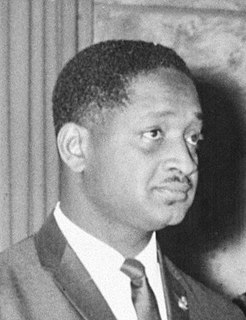A Quote by Jacob Rees-Mogg
No one questions the right of individuals to go to the Central Lobby to explain their views to their own Member of Parliament. It is important for those in power to hear arguments in favour of policies from all sides and ought to lead to better decision-making.
Related Quotes
You ought to be able to explain why you’re taking the job you’re taking, why you’re making the investment you’re making, or whatever it may be. And if it can’t stand applying pencil to paper, you’d better think it through some more. And if you can’t write an intelligent answer to those questions, don’t do it.
Parliament is not a congress of ambassadors from different and hostile interests; which interests each must maintain, as an agent and advocate, against other agents and advocates; but parliament is a deliberative assembly of one nation, with one interest, that of the whole; where, not local purposes, not local prejudices ought to guide, but the general good, resulting from the general reason of the whole. You choose a member indeed; but when you have chosen him, he is not a member of Bristol, but he is a member of parliament.
Parliament is for discussion. Parliament is to show dissent. Parliament is to give an argument for one's opposition, to present an argument when they support. To uphold this basic spirit of Parliament, is the responsibility of every person who values democracy. It is the responsibility of those present in the Parliament and those outside. It is the responsibility of those in power and those not in power. This is a matter of spirit and it should be followed.
If you sit down and you look at the policies, and analyze where the administration's going and what they seem to be dedicated to trying to achieve, I think a lot of Americans, myself included, certainly, have major questions about that, or major views that don't think those are the proper courses of action that we ought to be following.
Americans need help understanding their world now more than ever. [TV] believes it's filled its obligation to the public because it's presented both sides. But most of what we're living through now has multiple sides, and those sides, if you take the extreme oppositional views, have to be brought together for people to make a decision about how to act on the information.
The great philosophers of the 17th and 18th centuries did not think that epistemological questions floated free of questions about how the mind works. Those philosophers took a stand on all sorts of questions which nowadays we would classify as questions of psychology, and their views about psychological questions shaped their views about epistemology, as well they should have.
We must not permit our respect for the dead or our sympathy for the living to lead us into an act of injustice to the balance of the living. I will not attempt to prove that Congress has no power to appropriate this money as an act of charity. Every member upon this floor knows it. We have the right as individuals to give away as much of our own money as we please in charity; but as members of congress we have no right to appropriate a dollar of the public money.
Finance ministers and central bank governors have the seats at the table, not labor unions or labor ministers. Finance ministers and central bank governors are linked to financial communities in their countries, so they push policies that reflect the viewpoints and interests of the financial community and barely hear the voices of those who are the first victims of dictated policies.
When I go in and talk to students about being a Member of Parliament, I say to them it took me 21 years from joining the Conservative Party as a 16-year-old to being elected as a Member of Parliament for the first time in Loughborough. It's a long journey, but the rewards when you get there, the feeling of accomplishment is huge.
Anticipating attacks, I should like to emphasize that I do not subscribe to the myths propagated by enemies of Israel and I am not blaming Jews for anti-Semitism. Anti-Semitism predates the birth of Israel. Neither Israel's policies nor the critics of those policies should be held responsible for anti-Semitism. At the same time, I do believe that attitudes toward Israel are influenced by Israel's policies, and attitudes toward the Jewish community are influenced by the pro-Israel lobby's success in suppressing divergent views.
A year ago Guyana became politically free and independent. She assumed the untrammeled right to make her own decisions on what ought to be done or ought not to be done within her border. Since then, hers has also been the right to decide what course she would take and to state her views and opinions positively in the fora of the world. As we celebrate the first anniversary of freedom, it is our duty to take account of what we have achieved or what we have failed to do, to note where we have done well and what we ought to have done better.































